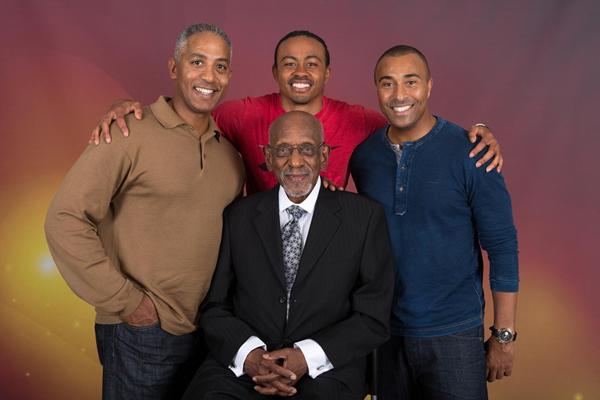 |
| Some of the greatest high hurdlers of all time. (From L to R) Renaldo Nehemiah, Aries Merritt, Harrison Dillard, and Colin Jackson. Photo courtesy of IAAF |
Further evidence of his multi talented athletic prowess was his four wins in the made for TV Superstars events in the 1980s. The track coaches gathered in Bloomington this weekend won't be after anecdotes on fly patterns or whether or not deflated footballs matter, but rather Nehemiah's wisdom on how to be the best at running fast over a lane of 42-inch high hurdles. Talking from his office in Reston, Virginia, Nehemiah, who now represents clients such as Olympic champion sprinter Justin Gatlin and 400 meter Olympic champion Kirani James, answered questions about his event and the things that have changed since he was the best in the world.
Technology, Nehemiah noted, has had the biggest impact on the event from camera phones, ubiquitous access to high quality video, to the composition of the track. The hurdles are lighter and the tracks faster than in his prime, Nehemiah said. These changes have influenced how races are run and won. In his day, Nehemiah added, the composition of the track wasn't a factor. People didn't talk more about the track's features--how "fast" it was--as much as about the strengths and weaknesses of the individual athletes.
A Roger Kingdom would assault the event, crashing through hurdles with raw power, while a technician, such as China's Liu Zhang was more like Nehemiah, a virtual ballet artist who "flowed" over the hurdles much as Mikhail Baryshnikov would flow across the stage at Lincoln Center. Balance, said Nehemiah, is the key to master hurdling. At its core hurdling is an all out sprint interrupted by a series of graceful bounding through the air. A key factor in getting from start to finish as fast as one can, he noted, was combining innate athleticism with something as simple as keeping the arms moving forward in a straight line, as they would in a 100 meter sprint. Not crossing the body, which can cause the body to pitch from side to side in wasted motion and energy instead of flash forward with all the momentum and drive pushing toward the finish.
Proper technique with the lead leg and trail leg are other skills need to be ingrained in the hurdler's "muscle memory" at an early age, so that those skills don't have to be reprogrammed later. It's far more efficient to teach the basics properly early in a hurdler's career than attempting to change a learned behavior that has been already hard wired into the neurological system, he said.
In events that are decided by razor thin margins even seemingly small "mistakes" can be the difference between winning and losing. So teaching the basics early is vital to an athlete's success. Something you can't teach, however, Nehemiah believes is the most important attribute for any athlete--the desire to get the best from yourself, to be the best you can be. That drive for success, athletic perfection, is an essential element of an athlete's success. That devotion to always learning, always pushing for something better, never resting on one's laurels or becoming complacent is something of a cliche. Probably because it is an essential attribute for those who want to succeed in any endeavor, Nehemiah says.
It has been a feature of Nehemiah's since his earliest efforts at locomotion. His nickname, Skeets, was given to him by his parents to describe the swiftness and determination Nehemiah had during the crawling stage of his infancy. At that early age, Nehemiah was focused on the basic premise of all racing--getting to the finish line as quick as possible. Without coaching or other incentives aside from completing his task as quickly as possible, Nehemiah was creating the building blocks of a career in sprinting and hurdling.
When he talks to the coaches this weekend his task will be just as simple. He does the talks, imparts what he's learned during his career in order to give back to the sport that has given him so much. Sharing and learning so the next generation will be able to enjoy the activities that have been the foundation of his athletic pursuits for decades.
If you want to read more about Nehemiah's stats, development as an athlete go HERE.

No comments:
Post a Comment